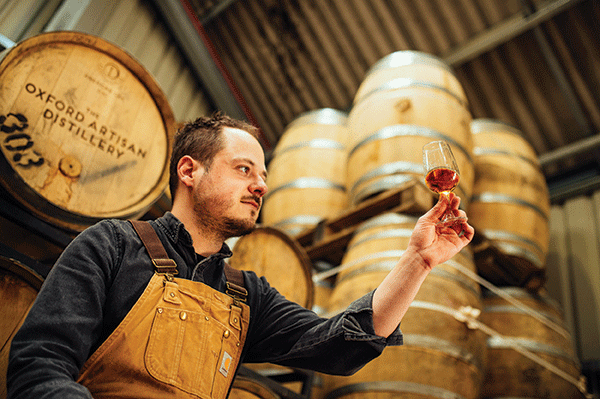Is there really any such thing as a green pint or an eco-friendly tipple? As Brewdog’s recent negative media attention proved, carbon offsetting is definitely not the answer. Making something and then planting trees won’t sufficiently reduce carbon emissions. Sustainability should never be an add-on, an afterthought or a tick-box exercise; that philosophy needs to run through every aspect of a business – as some artisan drink companies are proving.
A rum deal
Two Drifters Distillery in Exeter reduces its carbon emissions by using certified 100 per cent zero emission energy sources, driving electric vans, using lightweight glass bottles, and minimising waste and water consumption. Plus it uses molasses from Tate & Lyle that would usually be sold for animal feed. Rum is made with sugar cane, raw sugar or molasses, which is produced in a tropical climate not found in the UK, so importing the waste product is the best option, before offsetting the emissions from transportation.
The company also actively removes more emissions than it produces through carbon capture technology (capture is different to offset and therefore not certified under an offset scheme). Since April 2019, it has removed 16.72 tonnes of carbon from the atmosphere via a company called Climeworks, which transforms carbon into solid chalk to be permanently stored underground at a carbon capture facility in Iceland.
Although this new technology is expensive, co-founder Russ Wakeham feels compelled to pay: “We’re effectively taxing ourselves at source,” he says. “Every company should be told to reduce their carbon emissions or be sent a carbon tax bill, but we need the whole world to do it otherwise somewhere there’ll be an unfair advantage.”

From grain to glass
“Ninety-eight per cent of our gin is grain, two per cent is botanicals, so it’s important that the grain is farmed responsibly. But a lot of the grain used by the alcohol industry is grown as monocultures in warmer places such as Ukraine,” explains Dave Smith, chief executive of Oxford Artisan Distillery, whose gin and vodka is certified organic. Whisky isn’t yet certified but heritage grains of rye, wheat and barley are all grown regeneratively, without any spraying or tillage at all, resulting in much taller crops rich in biodiversity. “Our farmers say they go beyond organic, and the genetic diversity from heritage varieties gives these crops strength and resilience – whatever happens with the weather, our yields remain consistent.”
That’s becoming even more critical as impacts of the climate crisis are increasingly felt by farmers. “With 550 distilleries in the UK now, I wonder how many sit down to talk about planting?” asks Smith, who collaborates with John Letts, an archeobotanist who has built up seed banks of ancient grains.
Now, Smith is working with Oxford Brookes University and Oriel College, Oxford University, to investigate how arable farming for his distillery can have positive socio-economic impacts on the rural community.

Is this whisky woo-woo?
Irish farmer Trevor Harris has grown barley like no other in County Kildare for the past three years. He has buried dung-filled cow horns under the soil, ditched farm machinery in favour of horses and sown barley seeds according to the position of the moon. Having followed these fairly wacky-sounding principles – first discussed in 1924 by Austrian philosopher Rudolf Steiner, and formalised into what’s practised today as biodynamic farming – Harris’ barley has been distilled into the world’s first biodynamic whisky.
Founder of Waterford Distillery, Mark Reynier, admits that as a business move, this might seem bonkers: “It makes little financial sense but for taste alone, it’s the holy grail. The healthiest possible soil equals the best flavour.” Much of this comes down to the rediscovery of the concept of ‘terroire’, which Reynier describes as “the three-dimensional interaction of topography, the living soil, bedrock, altitude, orientation and microclimate on the plant and its fruit”. While this terminology is more commonly associated with wine and cheese, terroire has recently been proven by scientists to exist in single malt whisky too.
“Whisky is made from just three ingredients, yeast, barley and water, and barley’s flavour is the source of whisky’s extraordinary complexity. If my finance director agreed, I’d buy all my barley from biodynamic production,” says Reynier.
Perhaps the fastidious principles of biodynamics are the ultimate form of regenerative agriculture, but could it become mainstream? Hopefully, says Reynier: “Look at the top wines, many of those vines are farmed biodynamically, they just don’t mention it because they don’t want to court controversy.”

Hop to it
Hops are notoriously vulnerable to disease and pests in the UK’s temperate climate, so most organic hops are imported from Belgium, Germany and New Zealand. Now, Stroud Brewery is teaming up with organic farmers and experts at the Organic Research Centre to identify disease-resistant hop varieties and produce low-impact organic beers in collaboration with Hugh Fearnley-Whittingstall’s River Cottage.
“UK-grown organic hops are difficult to get hold of, and the challenge of growing them is the largest barrier to increasing production of UK organic beer,” says Greg Pilley, managing director of Stroud Brewery, one of only five dedicated organic breweries in the country.
“We’re aiming to identify varieties that farmers can grow more confidently, and as a brewer I’d like to have regular UK supplies of organic hops – there’s also a huge variety of flavours to tap into, which could help British brewers create more distinctive products.”
The findings from the trial will be shared with organic and non-organic growers alike, helping them cut pesticide use.
While these artisan drinks might have a higher price, they also have a wider positive impact and provide sustainable farmers with a much-needed diversified income.
This article was originally published in the Wicked Leeks summer 2021 issue. You can read the full magazine for free on Issuu here.












0 Comments